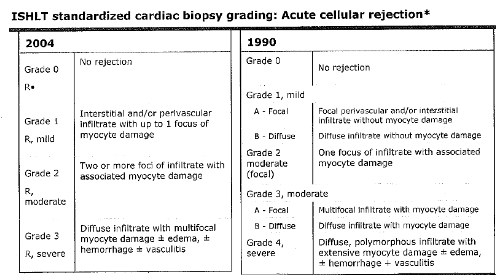This reaction is called rejection. We showed for the first time that donor-derived DNA is a predictive marker for chronic lung rejection and death and could provide critical time-points to intervene perhaps preventing these outcomes Valantine said in the release.
 Fear Of Rejection Managing The Transplant Patient In The Ed Emergency Physicians Monthly
Fear Of Rejection Managing The Transplant Patient In The Ed Emergency Physicians Monthly
Swelling of your feet hands or ankles.

Signs and symptoms of heart transplant rejection. Once rejection is detected early via this test doctors would then have the option to increase the dosages of anti-rejection. Doctors frequently take samples of small pieces of the transplanted heart to inspect under a microscope. Chills and aches.
Current tests used to detect heart transplant rejection rely on frequent and painful biopsies of heart tissue. Heart transplant recipients are carefully monitored for signs of rejection. When symptoms of acute heart transplant rejection occur they can include.
Experiencing flu-like symptoms nausea tiredness body aches diarrhea Feeling tender over the transplant site. These clinical symptoms include. During chronic rejection the persons immune system continually attacks the transplanted organ.
No treatment for the condition yet exists. A patient experiencing chronic rejection doesnt display symptoms until the situation is too advanced to do anything about it. Immunosuppressant medication can reduce the risk of this happening but cannot always prevent it completely.
Chest pain Shortness of breath. Feeling tired or weak. Those biopsies run the risk of damaging the heart.
But the bodys immune system sometimes attacks transplanted organs. Flu-like aches and pains. Abstract A 44-year-old woman who had undergone orthotopic cardiac transplantation in 1999 presented acute allograft rejection 4 months after childbirth.
Shortness of breath orthopnea paroxysmal nocturnal dyspnea elevated neck veins ascites and peripheral edema. This is where the immune system recognises the transplanted heart as foreign and attacks it. These symptoms may feel somewhat like you felt before your transplant.
For example patients who reject a kidney may have less urine and patients who reject a heart may have symptoms of heart. Eventually the damage builds up enough that the organ stops working. Feeling tired or weak Fever or chills Shortness of breath Fast or irregular heartbeat Drop in blood pressure Swelling of your feet hands or ankles Sudden weight gain Flu-like aches and pains Reduced amounts of urine.
What are the symptoms of heart transplant rejection. 6 Call your doctor immediately however if you experience any of these symptoms of heart-transplant rejection. Rejection usually occurs in the days weeks or months after the transplant although it can sometimes happen years later.
Acute or rapid rejection usually happens in the first year after transplantation. Swelling hemorrhage and vasculitis can. Symptoms may include.
Heart rejection can also occur without symptoms. Flu-like symptoms such as chills nausea vomiting diarrhea loss of appetite headaches dizziness body aches tiredness What are the signs of heart transplant rejection. Symptoms may include swelling and shortness of breath with activity and a gradual decline in exercise tolerance may be noticed.
Feeling tired or weak. General discomfort uneasiness or ill feeling. How is lung transplant rejection.
Acute AMR may result in hemodynamic compromise and is observed. Unfortunately the transplant patient will not experience the most common symptom of heart attack - angina or pain. If you are experiencing any of these symptoms contact your transplant coordinator immediately.
Drop in blood pressure. Later the heart transplant patient with acute rejection will usually have symptoms referable to and typical of the development of heart failure including dyspnea with exertion orthopnea paroxysmal nocturnal dyspnea and edema. The symptoms depend on the transplanted organ or tissue.
These symptoms can include. Symptoms of rejection can include. Ncbinlmnihgov Cell damage is present.
The organs function may start to decrease. Chronic rejection can occur after years. Symptoms of heart transplant rejection.
There are several symptoms that can be related to transplant rejection. Some of the symptoms of acute heart transplant rejection include. Rejection may not cause symptoms.
When symptoms of acute heart transplant rejection occur they can include. The lack of pain makes it necessary to routinely check for the presence of chronic vascular rejection. Reduced amounts of urine.
Symptoms vary depending on the kind of organ transplant youve had. And many of these high-risk patients didnt have symptoms. Pain or swelling in the area of the organ rare Fever rare Flu-like symptoms including chills body aches nausea cough and shortness of breath.
The problem may only be found during follow-up tests after the surgery. Fast or irregular heartbeat. Be on the lookout for the signs of rejection.
Pain at the site of the transplant. Its important to keep all your follow-up appointments.
